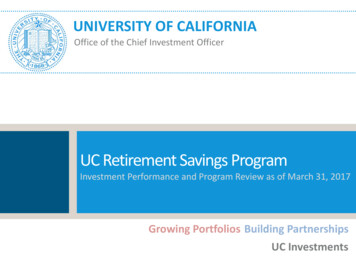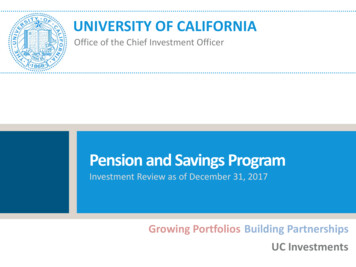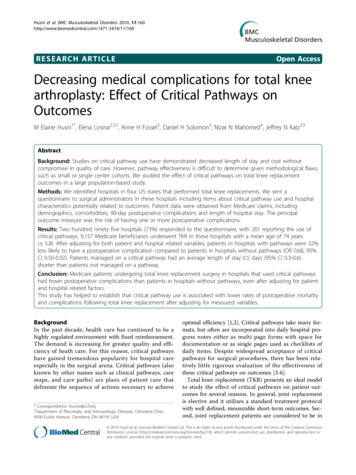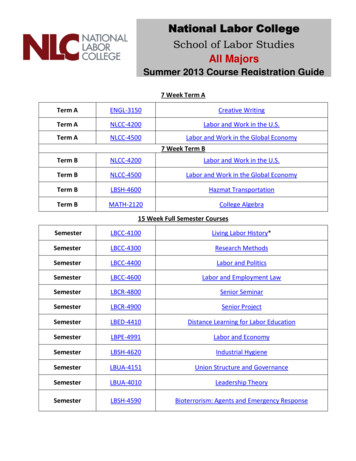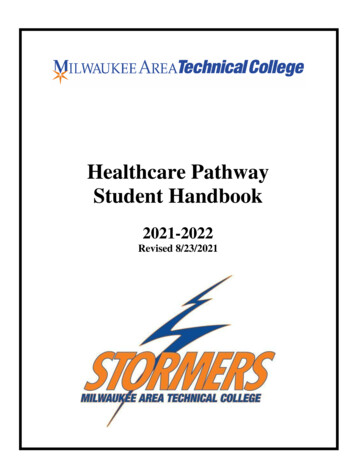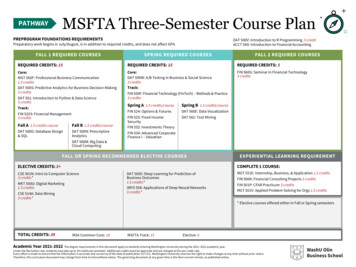
Transcription
PATHWAYMSFTA Three-Semester Course PlanPREPROGRAM FOUNDATIONS REQUIREMENTSDAT 500V: Introduction to R Programming .5 creditACCT 560: Introduction to Financial AccountingPreparatory work begins in July/August, is in addition to required credits, and does not affect GPA.FALL 1 REQUIRED COURSESSPRING REQUIRED COURSESFALL 2 REQUIRED COURSESREQUIRED CREDITS: 15REQUIRED CREDITS: 15REQUIRED CREDITS: 3Core:MGT 560F: Professional Business Communication1.5 creditsDAT 500S: Predictive Analytics for Business Decision-Making3 creditsCore:DAT 500W: A/B Testing in Business & Social Science3 creditsTrack:FIN 560G: Seminar in Financial Technology3 creditsDAT 561: Introduction to Python & Data Science3 creditsTrack:FIN 5203: Financial Management3 creditsFall A 1.5 credits courseFall B 1.5 credits/courseDAT 560G: Database Design& SQLDAT 500N: PrescriptiveAnalyticsDAT 560M: Big Data &Cloud ComputingFIN 550F: Financial Technology (FinTech) – Methods & Practice3 creditsSpring A 1.5 credits/courseSpring B 1.5 credits/courseFIN 524: Options & FuturesDAT 560E: Data VisualizationFIN 525: Fixed IncomeSecurityFIN 532: Investments TheoryDAT 562: Text MiningFIN 534: Advanced CorporateFinance I – ValuationFALL OR SPRING RECOMMENDED ELECTIVE COURSESELECTIVE CREDITS: 3 EXPERIENTIAL LEARNING REQUIREMENTCOMPLETE 1 COURSE:CSE 501N: Intro to Computer Science3 credits*MKT 500U: Digital Marketing1.5 creditsCSE 514A: Data Mining3 credits*DAT 565E: Deep Learning for Prediction ofBusiness Outcomes1.5 credits*INFO 558: Applications of Deep Neural Networks3 credits*MGT 551E: Internship, Business, & Application 1.5 creditsFIN 500K: Financial Consulting Projects 3 creditsFIN 501P: CFAR Practicum 3 creditsMGT 501V: Applied Problem Solving for Orgs 1.5 credits* Elective courses offered either in Fall or Spring semestersTOTAL CREDITS: 39MSA Common Core: 18MSFTA Track: 15Elective: 6Academic Year 2021-2022 The degree requirements in this document apply to students entering Washington University during the 2021–2022 academic year.Under the flat tuition rate, students may take up to 18 credits per semester. Additional credits must be approved and are charged at the per credit rate.Every effort is made to ensure that the information is accurate and correct as of the date of publication (5/7/21). Washington University reserves the right to make changes at any time without prior notice.Therefore, this curriculum document may change from time to time without notice. The governing document at any given time is the then-current version, as published online.
MSA – Financial Technology Course DescriptionsSummer Foundations WorkshopsMKT 500V Basics of R ProgrammingR has become the tool of choice for many data science and customer analytics professionals in every industry and field. Itis not surprising to see a requirement for being familiar with R in job descriptions. R is very flexible in carry out dataanalysis. Part of the benefit of being open source is that many programmers/researchers are constantly introducing newstatistical analysis tools into R through R packages. Given all the benefits, R does have a relatively steeper learningcurve. To better prepare MSCA students, we introduce this 2 day introduction to R programming course. This class willhelp you master the basics of R. We will start from the very beginning - installation of the program. No prior knowledge inprogramming is required. Through in class demonstration and lots of hands-on practice, by the end of the second day,you will have the chance to undertake your own data analysis and solve relevant business problems using R. 0.5 Credits.Graded Pass/Fail.ACCT 560 Introduction to AccountingIn this course, we will study the three fundamental financial accounting issues, including (1) recognition, (2)measurement/valuation, and (3) classification/disclosure and consider how business transactions are reflected on thefinancial statements using generally accepted accounting principles (GAAP). We will cover the four primary financialstatements (balance sheet, income statement, statement of stockholders’ equity, and statement of cash flows), thesupporting footnotes to these statements, and several reports (annual reports, proxy statements, and press releases). Thecourse incorporates both a preparer’s perspective (i.e., GAAP requirements for recording and presenting financialinformation) and a user's perspective (i.e., how an investor or analyst can interpret and use financial statementinformation).Required Core CoursesDAT 500N Prescriptive AnalyticsThis course covers optimization models and tools as they apply to the design and analysis of supply chains. Productionplanning, distribution, network design, and revenue management problems are covered using the methods of linear, nonlinear, and integer programming. Upon successful completion of this course, students will demonstrate competency informulating and solving supply chain optimization models of real-life complexity using state-of-the-art software. They willbecome proficient with industrial strength software tools like AMPL and Gurobi alongside Excel’s Solver. The courseemphasizes proficiency in model-building and using software tools rather than theory.1.5 creditsDAT 500S Predictive Analytics for Business Decision-MakingPredictive Analytics deals with the employment of formal learning from business experience, using business data, topredict the future behavior of customers or other critical organizational elements in order to drive better businessdecisions. This course emphasizes data situations that students are likely to face in marketing, finance, manufacturingand consulting jobs. Students will analyze real-world business datasets using various advanced analytic techniques suchas logistic regression, decision trees, neural networks, stochastic gradient boosting, MARSplines, Ensembles, Clustering,Associations etc. The focus of the course lies in the conversion of raw and messy business data in to robust actionablepredictions for decision-making. 3 credits.DAT 500W A/B Testing in Business and Social ScienceThis course introduces students to causal methods that are used to measure the impact of business and policy decisions.The key insight of the course is that correlation does not imply causation and therefore cannot measure impact. In thisclass, we will learn about A/B testing and other causal methods, as well as how to implement them in business, economic,and policy situations. 3 credits.DAT 560G Database Design and SQLDatabases are at the foundation of every organization's information strategy. Understanding the structure of databasesand mastering the tools to analyze data are essential skills in any role. The tools developed in this course assist studentsin implementing a company's data management strategy and developing well-grounded analytical recommendations. Inthis course, we focus on understanding how data is structured in relational databases. With vast amounts of dataavailable, from disparate sources, effective organization of the data is essential to its utilization. To complement this, weutilize SQL (Structured Query Language) as the primary tool to extract data for managerial reports and for advancedanalytical models. Practical experience with current relational database software is developed throughout the course. Thiscourse is required for MS/CA students and priority will be given to SMP students. 1.5 credits.
DAT 560M Big Data and Cloud ComputingThe growth in available data is a challenge to many companies. This presents an opportunity for companies to conquerthe vast and various data available to them. The growth in data includes traditional structured data, as well asunstructured data created by both people and machines. It is essential for analysts to be comfortable in the newtechnologies and tools that are being developed to store, retrieve, analyze, and report, using the vast data resourcesavailable. This course introduces students to the technologies currently deployed to overcome the challenges of Big Data.Prerequisite: MGT 560G. 1.5 credits.DAT 560N Introduction to CybersecurityThis course covers a broad range of cyber security terms, definitions, perspectives, concepts, and current trends with afocus on managing risk and the use of information and cyber security as business enablers. Students will complete acybersecurity analytics-related project as part of the coursework. 1.5 credits.DAT 561 Introduction to Python and Data ScienceThis is a 3-credit course offered to MSBA students. It provides students the necessary skill set to extract reliable insightsfrom large datasets prevalent in various business applications, such as supply chain management, marketplaceoperations, healthcare analytics and financial engineering, using Python. In this course, students will develop basic toolsto understand Python programs and implement data processing pipelines using Python. In particular, students will learnhow to acquire, clean, analyze and visualize data in Python, which they will then use to improve decision-makingprocesses. Throughout the course, students will use the Python programming language, which is very effective for datamanipulation, reporting, and complex optimization. Topics covered include introduction to Python programming, dataacquisition and cleaning, data manipulation, current multi-source data collection technology used in practice, basic datavisualization using Matplotlib, ggplot2 and Bokeh. 3 credits.DAT 562 Text MiningConsumers and companies constantly generate large amounts of unstructured or lightly structured texts on the web andoffline: exchanges of consumer opinions on products and services on social media, transcripts of phone conversationswith customer representatives, open-ended surveys, etc. By employing text analytics, businesses can derive at scalevaluable insights into consumer attitudes to brands, competitive landscape, and customer relationships, among otherapplications. This course introduces students to the methods of mining, organizing, summarizing, and analyzing textualdata with the objective of driving business decision-making. 1.5 credits.MGT 560F Professional Business CommunicationCommunication is the process of sending and receiving messages, however, communication is effective only when themessage is understood and when it stimulates action or encourages the receiver to think in a new way. This course willintroduce students to fundamental best practices in business writing and business speaking that will ensure effectivecommunication. Students will participate in activities that will develop professional business communication skills in bothwriting and speaking. These will include: preparing, writing and delivering presentations, composing clear concisebusiness messages in a variety of formats, understanding emotional intelligence to reach the audience and utilizing criticalthinking as a basis for communication strategies. 1.5 credits.Required Track CoursesFIN 5203 Financial ManagementStudents will learn in this class how the decisions of a company affect shareholder value and what decisions can increaseit. To understand the perspectives of shareholders, we will study basic principles of investing: time value of money,valuation of debt and equity securities, discounted cash flow as a foundation for stock prices, the impacts of diversificationand leverage on portfolio risk, the relationship between risk and expected return in securities markets, and capital marketefficiency. We will use these principles to analyze capital investment decisions by estimating cash flows and discountingthem at the appropriate cost of capital. We will also study how shareholder value is affected by a firm's financingdecisions, such as the choice of using debt or equity capital. 3 credits.FIN 524 Options & FuturesFocuses on futures with an introduction to options. Discusses forward and futures pricing, and the use of various futurescontracts to hedge commodity price risk, interest risk, currency risk, stock portfolio risk, and other risk exposures.Provides both binomial tree and Black-Scholes models for option valuation. 1.5 credits.
FIN 534 Advanced Corporate Finance I – ValuationThis course considers a broad range of issues faced by corporate financial managers with respect to the valuation ofprojects, divisions, and entire companies. The prime focus will be on assessing the profitability of different businessalternatives in a forward-looking sense. It will explicitly consider the impact of financing decisions on the valuation ofbusiness alternatives. Other topics covered include an examination of EVA as both a valuation and performancemeasurement tool, and a brief introduction to Real Options as an alternative to discounted cash flow analysis. The courseis designed to be "hands-on," and will heavily focus on direct applications of the theory and the individual development ofspreadsheet modeling skills. Students who successfully complete the course should possess a set of cutting-edgevaluation skills. 1.5 credits.FIN 532 Investment TheoryA course in the theory of risk and return in capital markets. Topics covered correspond to those which are covered in theCFA level 1 exam. We will cover the CAPM and APT models of asset pricing and will discuss various measures of mutualfund performance evaluation which arise from these models. We will discuss interest rate determination and alsointroduce the concepts of price and reinvestment risk in fixed income securities. 1.5 credits.FIN 550F Financial Technology – Methods and PracticeThis course is offered to MSA students in the FinTech track. The course will provide an overview of financial technologyand will cover specific topics in this area. Topics covered include data-driven credit modeling, crypto currencies, digitalwallets and blockchains, smart contracts, robo advising, high-frequency trading, crowd funding, and peer-to-peer lending.The course will also discuss regulatory aspects of FinTech. The course will cover different methods as well as practicalapplications. 3 credits.FIN 560G Seminar in Financial TechnologyThis course is offered to MSA students in the FinTech track. The course will provide students with an opportunity to delvedeep into one aspect of financial technology and write an extensive paper on this topic. The paper needs to include ananalytical component and may be either a research paper analyzing data and testing some hypotheses related to financialtechnology or an in-depth case study of a FinTech company or technology and their implications. Other topics may alsobe considered with the instructor's approval. 3 credits.MGT 501 Management Center PracticumStudents work in four-person teams on consulting projects, applying insights from their course work to real-world businessproblems under faculty supervision. Each student is expected to spend about 150 hours on the project. Grades are basedon the quality of the final written and oral reports, as determined by the faculty supervisor. Students are only eligible toparticipate in 1 Practicum Course per semester, if selected. PREREQUISITES: You must apply for Practicum projects.Students are notified when projects are available. 3 credits.ElectivesDAT 537 Data Analysis, Forecasting and Risk AnalysisThis course presents a modem and contemporary coverage of several econometric models that are used for the analysisand forecasting of business data. The basic building blocks for the analysis are regression time series models. Broadcoverage of non-seasonal and seasonal ARIMA models is included. The important family of ARCH-GARCH models, usedto represent changing volatility, are also covered in detail. These models are widely used in option pricing and in otherfinancial applications. The course includes some extensions of these models to multivariable problems. Students areexposed to numerous real data sets in class and in assignments. All the models are analyzed with a popular econometricssoftware package that is employed in business. A group project is required. 3 credits.FIN 500W Venture Capital MethodsThis course provides basic terminology and tools used in evaluation of early-stage venture investing. The course will alsocover the history of venture capital and discuss the different strategies that a venture capital firm could utilize. The coursewill use case studies and outside speakers to provide overviews of certain aspects of the venture capital industry includinginvestment strategies and VC firm operations. Note: Graduate Business Master Students only. 1.5 credits.FIN 500X Venture Capital PracticeThis course is the capstone for students interested in early stage investing. The course objective is to develop practicalskills for angel and early-stage investing in private companies. Students will partner with professional investors in the St.Louis community to perform various activities, including finding deals, performing evaluations of investment opportunities,and where appropriate negotiating, arranging financing, and closing investments. The course also relies on bringing ininvestment professionals from the local community to provide real-world perspective on early stage investing. PREREQ:Venture Capital Methods and instructor approval 1.5 credits.
FIN 500Y Private Equity MethodsThis course will provide the student with an understanding of the basic terminology, due diligence and analyticalmethodologies critical to evaluating Private Equity investments. The course will also cover the history of Private Equityand the different roles of Private Equity – growth capital, LBO / MBO, Roll-Up, etc. in the evolution of the firm. PrivateEquity funds in the context of the overall market (strategic vs. financial acquirers) will be discussed as will be the role ofleveraged lending and bank financing of financial sponsors. Private Equity as an investment and its role in portfolioconstruction will be analyzed. Finally, the legal structure of Private Equity funds in the context of firm control andgovernance will be reviewed. 1.5 credits.FIN 500Z Private Equity PracticeThis course is the capstone for students interested in pursuing careers in private equity. Students will develop practicalskills for investing in private companies. Students will partner with professionals in the St. Louis community to performvarious activities, including transaction sourcing, evaluating investment opportunities and, where appropriate, negotiating,arranging financing, and closing investments. The course also heavily relies on bringing in professionals from the localcommunity to provide real-world perspectives on private equity investing. Prerequisite: FIN 500Y. 1.5 credits.FIN 523B Mergers & AcquisitionsThe course will provide an in depth view of the theory and empirical regularities of various corporate control transactions.Specifically, we will discuss valuation of target firms, possible sources of value creation, various motives for mergers, taxconsequences of mergers, legal issues in mergers, financing an acquisition, defensive tactics in hostile takeovers, goingprivate transactions and bidding behavior of acquirers. The method of instruction is a mix of lecture and case analysis.Prerequisite: FIN 534. 1.5 credits.FIN 524B Derivative SecuritiesProvides an in-depth analysis of valuation and trading strategies for options and other derivative securities which haveapplications across areas of finance such as hedging, swaps, convertible claims, mortgage payments, index arbitrage,insurance, capital budgeting and corporate decision making, and are responsible for many new innovations anddevelopments of the financial markets. Prerequisites: FIN 524. 1.5 credits.FIN 527 Financial MarketsThis course will facilitate further learning in the finance track by providing insights into various financial markets, financialinstitutions, associated market participants, select representative transactions and industry conventions. Students willexamine the role of regulators, rating agencies, commercial and investment banks, and investors in the debt, equity andderivatives markets. In addition, in the context of the Financial Crisis, the role of regulation, monetary policy, leverage andhuman behavior will be discussed as possible root causes of the crisis with an emphasis on the various market failures inspecific markets and their impact on market participants. Lastly, the role of revised regulations and the future of financialinnovation will be debated. 1.5 credits.FIN 528 Investments PraxisIn this course students serve as managers of a portfolio, the Investment Praxis Fund, which is owned by the school.Students will analyze investment opportunities in various industries and present recommendations to the class forpossible purchases or sales of securities. Students must demonstrate that their investment decisions are consistent withthe style and objectives of the fund. Valuation tools and financial statement analysis are emphasized as part of a thoroughanalysis. The course will emphasize contact with investment professionals such as portfolio managers, securities traders,consultants, custodians, and plan sponsors. At the end of the semester the students will report on their performance to theadvisory board of the fund which is composed of University financial officers and outside investment professionals. 3credits.FIN 530 International FinanceMeasuring and hedging exposures to exchange rate fluctuations is a central topic of this course. The relationships amongspot and forward exchange rates, interest rates, and inflation rates are described. Additional topics include capitalbudgeting for international projects, international capital markets, and international portfolio diversification. 1.5 credits.FIN 532B Data Analysis for InvestmentsThe objective of this course is to obtain an in-depth understanding of some of the major empirical issues in investments.Based on recent research articles and cases, students are required to learn the facts, theories and the associatedstatistical tools to analyze financial data. The topics for this course include models of stock returns, Bayesian andshrinkage estimations for expected returns and covariances, multifactor asset pricing models, GARCH models, principalcomponents, asset allocation, stock screening, predictability, performance evaluation, anomalies, limits to arbitrage andbehavioral finance. Prerequisite: FIN 532. 1.5 credits.
FIN 533 Valuing Strategic Corporate InvestmentsThe objective is to obtain both an in-depth understanding of the real option theory and the associated implementationskills in real-world applications. The theoretical tools are binomial models and Monte Carlo simulations. The applicationtopics cover all types of typical real options, cases of leasing, R&D, take-over, market expansion, growth values, dotcoms, staged investments, multiple project uncertainties, ranging from standard European and American options tocompound and rainbow options. 1.5 credits.FIN 534B Advanced Corporate Finance II – FinancingThis course considers a broad range of issues faced by corporate financial managers with respect to the financing ofinvestment opportunities. In this course, we turn to the right-hand side of the balance sheet as a direct follow up to theskills acquired in the Advanced Corporate Finance I - Valuation, a course that focused on the left-hand side of the balancesheet. The course is designed to be “hands-on”, and we will heavily focus on direct applications of the theory of financingto business practice. To that end, we will cover topics related to the valuation of bond and convertible securities,estimating the costs of financial distress, the reorganization of firms in financial distress, deriving an optimal capitalstructure, and the effects of management stock option grants on valuation. Prerequisite: FIN 534. 1.5 credits.FIN 534C Advanced Corporate Finance III – Corporate Financial StrategyThis course addresses advanced valuation topics, and applies both theory and practical valuation methods to value realworld companies-instead of case studies. You will be valuing foreign and U.S. companies in various industries such asbanking, industrials, mining, and information technology. This course assumes that you have basic valuation knowledgeand exposes you to the complexities involved in performing real-world valuations, and the myriad of issues thatpractitioners must address. Prerequisite: FIN 534. 1.5 credits.FIN 536/ACCT 507 Financial Issues in LeasingThis course is devoted to studying the various elements that are involved in identifying leasing opportunities andstructuring a lease. Topics covered include accounting and tax issues related to leases, the legal and financial structure ofa lease, options embedded in lease agreements, and the marketing and negotiation of leases. 1.5 credits.FIN 549H Real Estate FinanceThis course provides a broad introduction to real estate finance and investments. Topics include both equity and debt. Webegin with an overview of real estate markets in the United States. On the equity side students will be introduced to thefundamentals of real estate financial analysis, including pro forma analysis and cash flow models, and elements ofmortgage financing and taxation. Ownership structures, including individual, corporate, partnerships and REITS will alsobe covered. On the debt side, we examine a number of financing tools in the context of the evolution of the secondarymortgage market, both residential and commercial. Additional topics related to real estate finance are covered in FixedIncome Securities (FIN 525). 1.5 credits.FIN 550C Endowments, Foundations & PhilanthropyThe course will cover topics in endowment and foundation governance, grant making and investment management aswell as fundamentals of philanthropic giving at both the foundation and personal levels. Topics covered includeinvestment policy statements, spending policies, portfolio construction, giving priorities, socially-responsible /environmental-social-governance investing, impact investing, program related investments, and tax considerations. 1.5credits.FIN 550D Hedge Fund StrategiesThis course provides both an overview of hedge funds and an in-depth analysis of their trading strategies. Topics coveredinclude structure, incentives, and performance evaluation of hedge funds, regulatory and taxation aspects of hedge funds,common trading strategies of hedge funds (e.g., market neutral, global macro, forex, activism, and event driven), and theacademic evidence on the performance and influence of hedge funds. Prerequisite: FIN 532 or instructor’s approval. 1.5credits.FIN 550E Behavioral FinanceThe course will cover topics in behavioral finance, which is a field of finance applying psychology to decisions of investorsand corporate managers. Topics covered include prospect theory and non-expected utility preferences, behavioral biasesand heuristics, limits to arbitrage, anomalies and their behavioral explanations, bubbles and their behavioral explanations,behavioral biases of individual vs. professional traders, and behavioral corporate finance. The course will cover theoreticalaspects, empirical and experimental evidence, as well as practical implications. Prerequisite: FIN 532 or instructor’sapproval. 1.5 credits.
FIN 560A Research Methods in FinanceThe course is designed to prepare students for independent research in finance by exploring methods and techniques in amanner that will allow the students to implement them correctly and efficiently. The curriculum will emphasize practicalapplications of empirical methods used in financial research and how to implement them. Students in the course will learnempirical methods in corporate finance and asset pricing; obtain basic knowledge and familiarity of the databases used incommon finance research; get exposure to recent research in finance which applies the methods covered; and learn howto implement the methods covered using relevant programming languages. 3 credits.MGT 511A Law & Business ManagementWe will review different rules of substantive law which affect the conduct of individuals and businesses. We will analyzedifferent legal theories and rules of substantive law which regulate the conduct of individuals and businesses and whichimpose liability for damages on individuals and business entities when those rules are violated. We will survey basic rulesof criminal law, intentional torts, and negligence. We will next focus on the rules affecting the making and performance ofcontracts, and the liability which results from breach of contractual relationships. This will include general contract law, aswell as specific rules that exist in the sale of goods and merchandise, and in the purchase, ownership and sale of realproperty. In addition, we will also analyze and compare the choices available for dispute resolution, including mediation,arbitration, and trial in court. 1.5 credits.
DAT 561: Introduction to Python & Data Science 3 credits Track: FIN 5203: Financial Management 3 credits Fall A 1.5 credits course DAT 560G: Database Design & SQL . CSE 514A: Data Mining 3 credits* DAT 565E: Deep Learning for Prediction of Business Outcomes 1.5 credits* INFO 558: Applications of Deep Neural Networks
